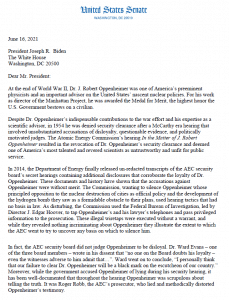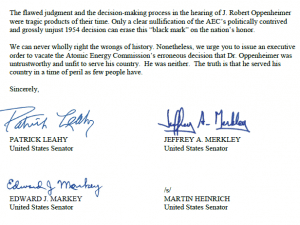Four senators ask Biden to clear Oppenheimer’s name
By Susan D’Agostino | June 28, 2021
 J. Robert Oppenheimer. Credit: James Vaughn. CC BY-NC-SA 2.0. Accessed via Flickr.
J. Robert Oppenheimer. Credit: James Vaughn. CC BY-NC-SA 2.0. Accessed via Flickr.
When the United States dropped atomic bombs on Hiroshima and Nagasaki at the end of World War II, 110,000-210,000 people were instantly killed. Japan surrendered in the days that followed. Not long after, nuclear physicist J. Robert Oppenheimer, who led [1] the Manhattan Project—the research and development program that produced the bomb—was awarded the highest US honor bestowed on civilians for contributions to the war effort: a Medal of Merit. But Oppenheimer came to regret his participation in the unprecedented devastation, which included thousands more deaths over time due to radiation exposure.
In a post-war leadership position at the Atomic Energy Commission (AEC), Oppenheimer voiced strong opposition to the development of the hydrogen bomb and argued for international controls on nuclear weapons. His advocacy was seized on by political enemies, and in 1954, he was called before an AEC tribunal that focused on his connections to people associated with communist organizations. That secret, McCarthy-era hearing found no evidence of disloyalty, yet nonetheless revoked his security clearance a mere 32 hours before it was due to expire. The events caused him great personal and professional pain until his death in 1967.
Now, more than 50 years later, US Sens. Patrick Leahy, Edward Markey, Jeffery Merkley, and Martin Heinrich have written a letter to President Biden asking to clear Oppenheimer’s name.

“People whose views differ from those in authority should not be targeted for speaking out,” said Tim Rieser, a senior foreign policy advisor to Senator Leahy. “[Oppenheimer] had a unique credibility and perspective on the future development and use of nuclear weapons.”
From the start, Oppenheimer’s case raised questions about the ability of government scientists to work and think independently. Reacting to the injustice of Oppenheimer’s hearing, Albert Einstein scoffed that the initials of the organization might stand for “Atomic Extermination Conspiracy.” David Lilienthal, a former Atomic Energy Commission chairman, wrote in his diary, “They are so wrong, so terribly wrong, not only about Robert, but in their concept of what is required of wise public servants.” Much later, in 2014, unredacted transcripts of the hearing, In the Matter of J. Robert Oppenheimer, vindicated the nuclear physicist, showing that the prosecution engaged in a wide variety of misconduct.
The four senators have asked President Biden to issue an executive order vacating the AEC decision that Oppenheimer was untrustworthy and unfit to serve his country. “He was neither,” they wrote. This is the second letter to a president they have written in defense of Oppenheimer; the first was addressed to President Obama. As they understand it, that letter was forwarded to the Energy Department, where it “died,” Rieser said.
“During the Trump administration, it was pointless to pursue this. But with the Biden administration, we felt that we should try again,” Rieser said.

The four senators’ efforts are as much about correcting the historical record as they are about reminding the president and the public that a scientist’s ability to think independently is a fragile, yet vital element for ethical scientific progress.
“Look at what happened during the Trump years. People lost their jobs because they stood up for what they believed in,” said Rieser. “Some were intimidated into silence for fear of retribution, while others resigned. There are [recent] similarities to what happened with Oppenheimer, and we should be concerned about that.”
Footnote:
[1] To be clear, J. Robert Oppenheimer was the theoretical physicist who served as director of the Los Alamos National Laboratory during the Manhattan Project. In this capacity, he was responsible for the research and design of the atomic bomb. Gen. Leslie Groves was the US Army Corps of Engineers officer who served as director of the Manhattan Project.
Together, we make the world safer.
The Bulletin elevates expert voices above the noise. But as an independent nonprofit organization, our operations depend on the support of readers like you. Help us continue to deliver quality journalism that holds leaders accountable. Your support of our work at any level is important. In return, we promise our coverage will be understandable, influential, vigilant, solution-oriented, and fair-minded. Together we can make a difference.
Keywords: Biden, J. Robert Oppenheimer, Senate, atomic bomb, nuclear scientist, nuclear weapons
Topics: Nuclear Risk, Nuclear Weapons, Opinion















Good article. What about this Tim Reiser ? https://www.latimes.com/archives/la-xpm-1994-04-18-mn-47358-story.html